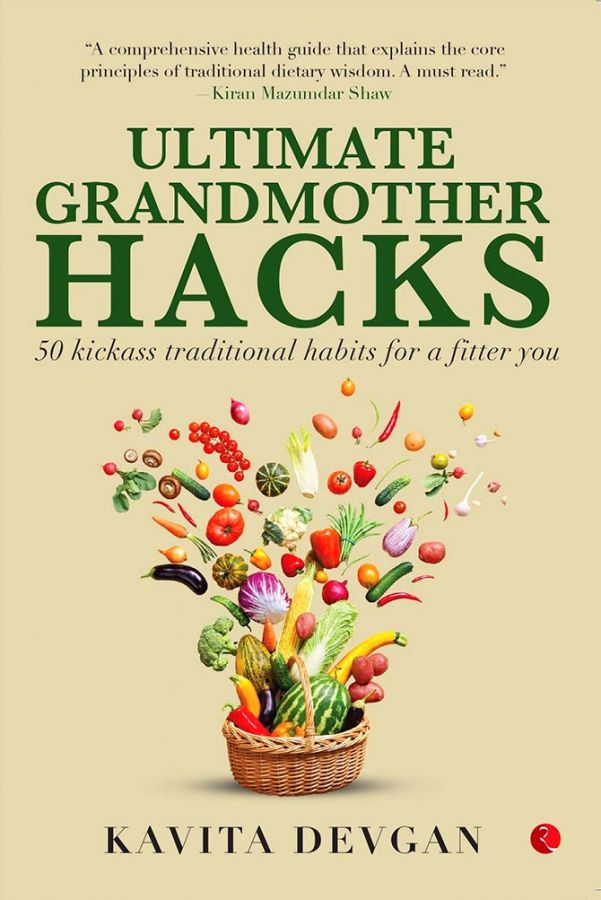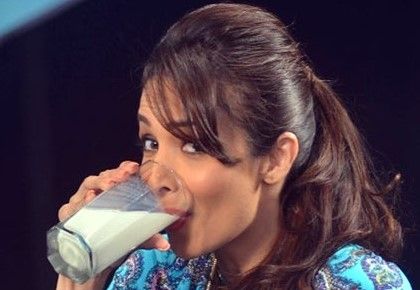Stopped drinking milk? Kavita Devgan gives you 8 reasons to start again.
Presenting an excerpt from her book Ultimate Grandmother Hacks: 50 Kickass Traditional Habits For A Fitter You.

Where's Your Milk Moustache?
There has never been any doubt about the great love that we Indians have for all things dairy, from milk to all the products that milk can churn out -- yoghurt, buttermilk, butter, cottage cheese, you name it.
Perhaps this has always been so because of the abundance of buffaloes and even cow milk here.
There never was any doubt about its importance in our diet, and the goodness it bestows on our body, for both children and adults alike.
However today, like all good things, milk and its need is also being questioned.
Why do you think this milky white elixir is tainted all of a sudden? There are no easy answers here.
Perhaps, it just succumbed to unnecessary research and even more unnecessary shunning of fat that has gone on an overdrive over the last few decades.
When you scrutinize a food too much, you are bound to find something amiss, or rather construct an anomaly using half-baked evidence.
That is probably what must have happened with milk as well.
Suddenly, it is being associated with weight gain, high cholesterol and multiple other ills in spite of the fact that there is no 'clear' reason for it.
No, you are never too old for a milk moustache!
There is no one who is unaware of the benefits of milk. It is the first source of nutrition for humans and continues to be an important food all through their lives.
However, it is wrong to think that milk is unnecessary or maybe even harmful for them, and that they can do away with it.
It is a healthy snack, a fulfilling appetizer and a perfect breakfast drink. Nothing else can compare to a wholesome glass of milk.
Our elders knew and followed this, and we should be smart enough to go back to this school of thought as soon as possible.
Adults need three glasses of milk (or equivalent dairy products) a day, especially adults who are vegetarians because they require good sources of protein to compensate for not consuming meat and eggs.
A glass of milk delivers a whopping 8 g of good quality protein, which is very essential--for building muscle, renewing skin and hair, producing enzymes and immunity boosting components, and even building DNA.
Nutrient Dense
Milk is one of the most nutrient-dense food sources available relative to the calories it provides.
Besides high-quality protein, it contains calcium, magnesium, potassium, iodine, vitamin D (when fortified) and B12, some vitamin B6, phosphorus, zinc, selenium, folate, niacin, pantothenic acid, riboflavin, vitamin A and choline.
Many of these nutrients are not sufficiently present in an average adult's diet.
In fact, removing dairy from a diet compromises both the macronutrient and micronutrient profile of the diet.
Also, even if calcium is delivered through other sources, it still results in a decreased intake of several other nutrients that milk provides so easily.
So ideally, you must make milk a part of your breakfast, as getting these vitamins and minerals first thing in the morning ensures a jump start on your nutrient requirements for the day.
The Weight Loss Conundrum

Listen to this account: 'Three months after my baby daughter was born, I went on a strict diet. I even cut off dairy from my diet,' a 34-year-old lawyer client living in Delhi told me.
'But this proved disastrous to my bones. I realized, albeit a little late, that I had cut off calcium just at the time I needed it most. Now I am back to two low-fat glasses of milk a day,' she added.
I hear statements like this all the time in my practice from clients or people around me who are somehow convinced that cutting off milk is the best thing to do when one is on a weight loss regime.
Well, this is misinformation. Omitting dairy products is not a good weight-loss strategy.
It is, in fact, a misconception that consumption of milk or yoghurt can increase weight.
Research clearly shows that milk intake does not interfere with weight loss; rather calcium from milk actually supports the effort to lose weight.
Also, with adequate calcium intake, dieters do not lose bone mass while losing weight, which is essential to stay healthy as one grows older.
Bone Strengthener
Milk’s bone saving grace is already well documented.
Milk is the best source of calcium which is essential for healthy growth, functioning, repair and durability of our bones and skeletal system, and to prevent osteoporosis and bone loss.
It is especially important for people doing high-impact exercises like jogging or lifting weights, as strong bones can take the extra heavy activity.
In fact, milk actually delivers a combination of four nutrients -- calcium, phosphate, vitamin D and protein -- and their unique interaction is a winning mixture to lengthen and strengthen bones.
Bones lengthen till the age of 20 and after that they strengthen. It is never too late to improve your bone health and to protect the bone tissue.
Therefore, it is essential to keep drinking milk.
Disease Buster
Milk helps reduce the risk of a stroke, cardiovascular and kidney diseases, and also plays a protective role against type 2 diabetes.
The magnesium and potassium in milk act as vasodilators, which lower the blood pressure and reduce the stress on the heart and cardiovascular system.
The peptides found in milk are also believed to inhibit the creation of ACEs (angiotensin-converting enzymes), which increase blood pressure.
The whey, calcium and medium-chain fatty acids in milk help improve insulin sensitivity, thus keeping diabetes at bay.
Improves Sleep
Milk is a great way to de-stress at the end of the day.
A glass of warm milk relaxes tense muscles and soothes frayed nerves.
It contains an amino acid-tryptophan, which helps in the production of sleep inducing brain chemicals, serotonin and melatonin, and so it helps you snooze better.
A glass of milk at night is the best thing possible for your sleep.
Rehydration
Our body needs to be frequently replenished with liquids.
Milk contains a good quantity of water molecules and is therefore a great fluid for rehydration.
Acidity Reliever
The kind of food we eat these days induces a lot of heartburn and gastric dismay.
Milk helps to coat the stomach lining to prevent heartburn and is one of the simplest and yummiest ways to alleviate this issue.
Essential for the Exercise Beast
A good protein source after you exercise is essential and milk fits that requirement perfectly.
It rehydrates and replenishes fluids that you lost during your workouts and also provides the essential protein the body needs to help the muscles recover.
Those who drink milk regularly have better body composition, improved training times and an overall, better physical shape than those who have sports drinks.
Which Milk to Choose?
I personally believe that your age does not necessarily play a role in choosing the kind of milk you should drink--as long as your total fat intake is within the prescribed limits.
For those who want to be cautious, thankfully, we now have options to choose from.
By standard definition, whole milk has 3.5 per cent fat, toned (or low-fat) milk has 2 per cent fat and skimmed milk has no fat.
Toned milk is a good option if you are watching your fat intake.
You might have heard that vitamins are fatsoluble, and that low-fat milk is less nutritious.
This is not a big concern as long as you look at the bigger picture. There is no compromise on calcium when you have skimmed milk.
Even if you have 200 ml of skimmed cow's milk, you'll get more calcium and fewer calories than 100 ml of full-fat buffalo milk.
Fat-soluble vitamin A, which is partially removed with the fat when milk is skimmed, can be compensated by a prudent intake of vegetables.
Choose as you wish but don’t remove milk from your diet entirely. Adults too require two–three glasses of milk (or equivalent dairy products) a day, especially vegetarians.
Unless, of course, you have gout or high uric acid or are on a low-protein diet for health reasons; then milk consumption might have to be restricted.
Also there are people who are lactose intolerant or in other words, have trouble digesting milk protein lactose, and suffer symptoms like bloating, nausea, stomach pain and diarrhoea.
If you avoid milk because of lactose intolerance, it is important to choose lactose-free alternatives within the dairy group like cheese, yoghurt, lactose-free milk or calcium-fortified soy milk.
So perhaps we all can do better if we begin spotting the milk moustache again everyday.
Excerpted from Ultimate Grandmother Hacks: 50 Kickass Traditional Habits For A Fitter You by Kavita Devgan, with the kind permission of the publishers, Rupa Publications.












 © 2025
© 2025